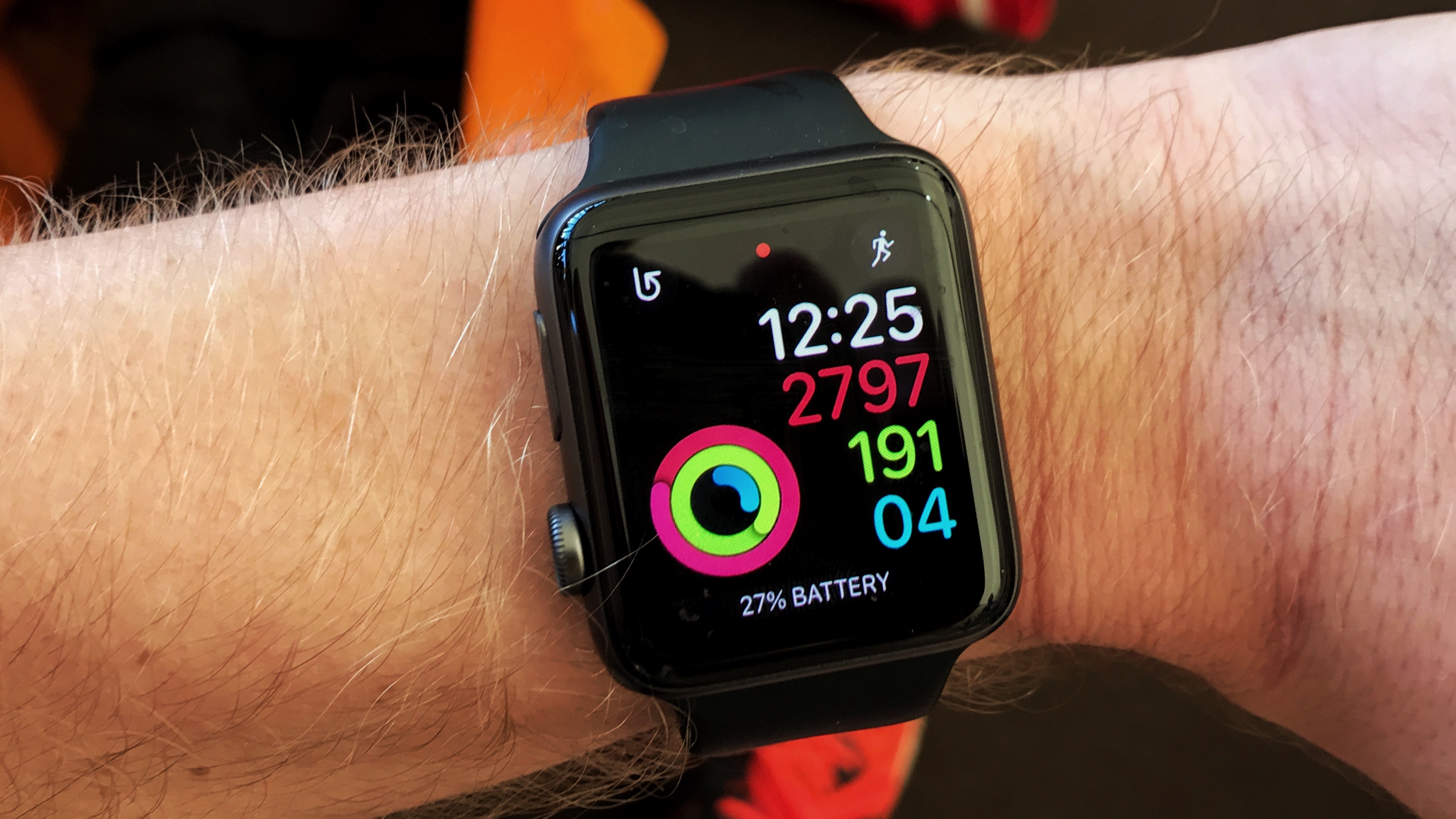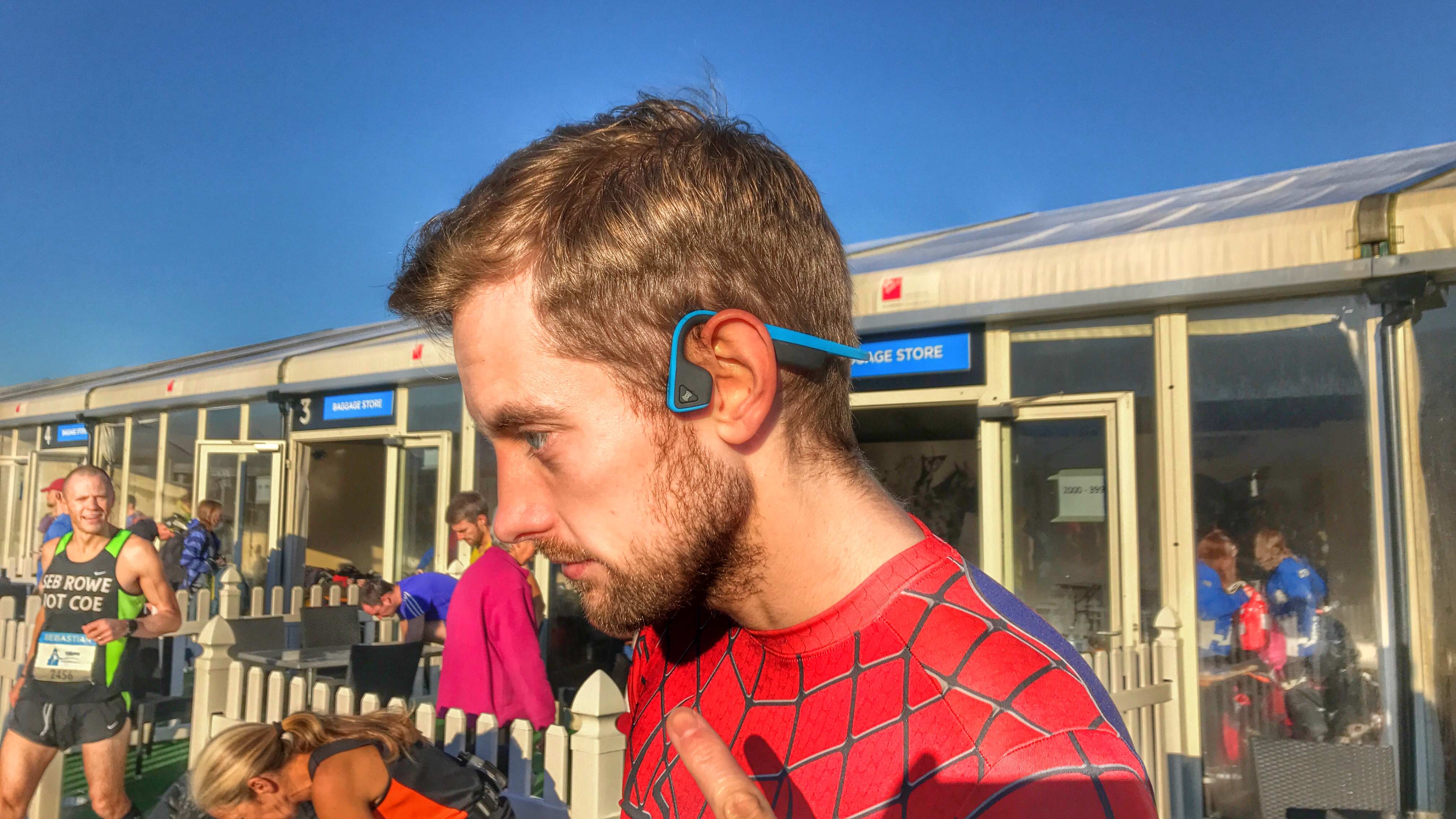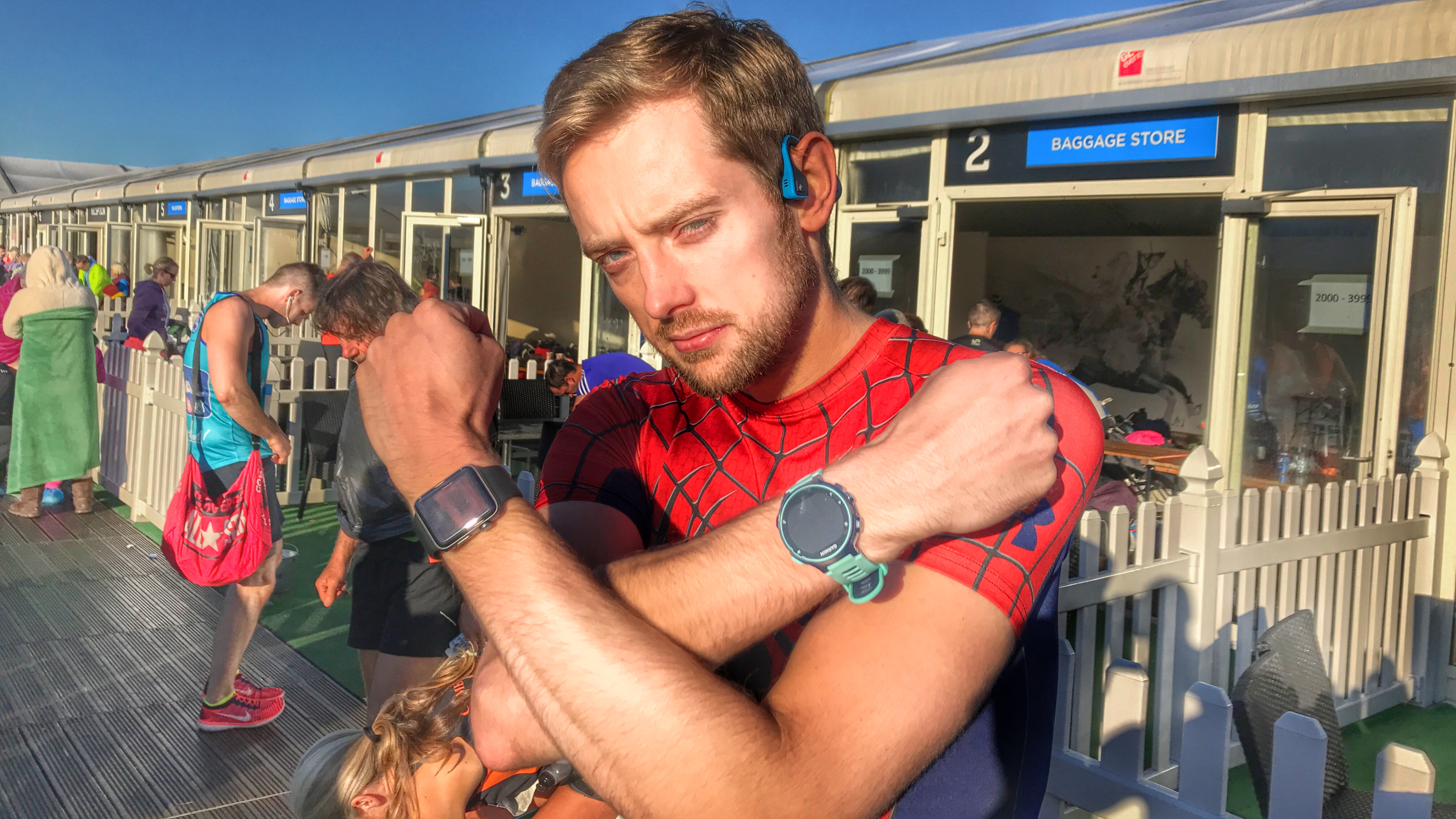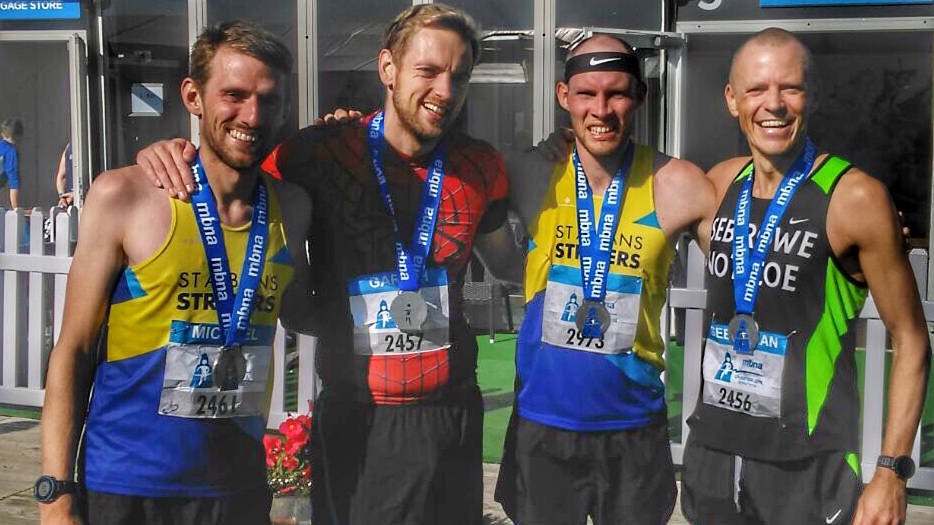Apple Watch 2: the full 26.2 mile marathon test
And bone conducting headphones get a workout too

Well, that's that done then. I'll get the bragging bit out of the way, mostly because I'm on the train back home and I'm still basking in the afterglow of a hugely successful race at the UK's Chester Marathon.
Two days ago I wondered whether the Apple Watch 2 could actually last a marathon - and all the prep that came with that - and now I've got the results.
Well, partly fueled by the heroics of the Apple Watch 2 (you'll see how in a moment) I managed a massive 14 minutes faster than my previous best - hitting 3:09:48. I know it's just boasting, but if I can't do it with you, then who can I?
The Apple Watch 2 deserves a strong mention for that performance, as it was a key part of the whole experience. The music streaming from it helped me structure my race and the whole thing worked perfectly, the playlist I put together kicking in at the key points.

Rather than run on time, I wanted to use music to trigger the changes in phase, something to listen for and take the decisions away from me.
So I was up for hours the night before crafting the perfect playlist of hard, then more chilled, then adrenaline-fuelled and then soothing songs.
Not worrying about a time meant I could just listen out for the right track to signify the change in phase, and when the song started playing to begin running hard. After eight miles I was champing at the bit to get going.
Get daily insight, inspiration and deals in your inbox
Sign up for breaking news, reviews, opinion, top tech deals, and more.
I was soaring as I suddenly started bounding past the people that had been slowing jogging past me for the last hour.

I was using the Aftershokz Trekz Titanium headphones for the event, bone conducting headphones that are 'race legal' as they leave your ears open to hear marshall commands or other runners, but vibrate the music into your head.
They're lightweight to the point of feeling flimsy, the buttons are hard (and slightly painful) to press and aren't cheap at £100 / $130 (around AU$170).
But they certainly do the job of letting you listen to music on a run (or cycle) while letting you hear people cheering your name or offering words of encouragement - and that's a big part.
In fact, at the start of the race I couldn't hear my music at all, due to the volume of the crowd, but once things started to thin out the combo was great - and I'm glad more races are recognising the legality of bone conducting headphones.
(There were a few people wearing normal headphones and part of me wanted to shout 'HEY LOOK THEY'RE CHEATING - but it shows that some people really need music to get around the course and can't stomach the thought of running without it).
Come on - did the Apple Watch die?
But you don't care about that. I know what many of you are wondering: how did the Apple Watch 2 last?
Well, with Bluetooth streaming to the Trekz Titanium headphones and the heart rate monitor firing on the underside of the wearable (along with GPS set up, obviously) I thought it was going to be a close thing, whether the Watch 2 would still be alive at the finish.
I shouldn't have worried.
I shouldn't have worried. Even with everything pumping away from the smartwatch, the Apple Watch 2 managed to only lose 72% of its battery life - which is, frankly, excellent for a modern smartwatch while tracking a run.
(NB: I was using the 42mm version - the larger model - of the Apple Watch 2. If you're going for the smaller and daintier 38mm option you might find the battery life isn't quite as good.)
If you extrapolate that time to battery loss, in theory the Watch 2 would be dead at 4 hours and 20 minutes - which is pretty decent.
Take the heart rate monitor off and use a chest strap instead (which helps the power drain) and I'd imagine you'll go easily over five hours without an issue.
But how did it compare to the Garmin Forerunner 735XT on my other wrist? Well, I was impressed how in sync the two of them were.

You're always going to get a little variance in distance between two watches, but the difference was 42.34KM for the Apple Watch 2 and 42.27 for the Garmin Forerunner 735XT - which was impressive.
However, they weren't so synchronised on the run. I'm inclined to trust the Garmin a little better, partly because it's got the heritage in tracking but also because it was within feet of the timing mats at 10KM, 20KM, 30KM and the finish.
The Apple Watch 2, however, started about three seconds behind the Garmin on each KM split, and then wobbled around after about 10KM in - sometimes bleeping to say I'd hit a kilometer early, and sometimes later.
However, it was never more than six seconds out per kilometer - so in short, the Apple Watch 2 isn't as accurate as a dedicated running watch, but it's not far off.
Buzzing along
Special kudos should go to Apple for a seemingly minor thing: the Taptic engine it has inside, the little buzzing motor that alerts you to look at your watch, is much better than Garmin's.
At least four or five times I looked down to see what the Apple Watch 2 wanted, only to find I'd done another kilometer and I'd missed it on the Garmin.
I'm hugely impressed with what Apple's created on the Watch 2 from a runner's perspective. It's bordering on the perfect running watch for anyone who's a) got an iPhone and b) is 'graduating' from being a beginner and reckons they could run a marathon in four and a half hours.
Sure, it's not 100% accurate on every split, but the overall time and distance is right. Getting music onto the Watch 2 requires an Apple Music subscription, a charger and a BLOODY LONG TIME (52 songs took me about 30 minutes to copy across).

Skipping the music in the race is possible - but you have to navigate through a a few apps and menus and press the right portion of the screen each time. Hard, but there if you need it.
It's a tough watch to stop at the end of the race - either you have to press both buttons at once, but lightly, or swipe the screen with sweaty digits and poke. Neither is as simple as PRESS THIS BIG BUTTON that most other watches offer.
But the biggest issue Apple has is that you can't do anything with that data from the Watch. Not being able to sync to Strava will be a big issue for a lot of people, or using it whichever is their favorite platform.
I've been digging into it and, in theory, Nike+ should be able to read the workout data and import it from Apple Health into the app - but it's not worked for me yet, and that's the only one I've found that can do such a thing. Others promise to do the same (Runkeeper is tipped to be able to) so I'll need to check other apps out.
I've spoken to Strava to see if it's planning on supporting the Apple Watch 2 and its GPS abilities any time soon, and got this response back:
"We are excited to see that Apple is introducing a native GPS into the Series 2 of the Watch. We are actively looking into how we can extend Strava's existing Apple Watch app to take advantage of the native GPS"
So… no. That said, Nike+ support is coming later this month when the Nike+ version of the Apple Watch 2 lands, and while that won't sync to Strava it's a step in the right direction.
But the upshot: the Apple Watch 2 far outperformed my expectations when it came to actually lasting a race.
It let me chuck away the phone and a heart rate chest strap and run unencumbered - and that felt like the sort of futuristic watch I'd expect to have in 2016.
I personally wouldn't switch to the Apple Watch 2 from something like a top-end Garmin, Polar or TomTom, but that's mostly because I want more dedicated running metrics and consistency to my races - the Apple Watch is still a bit too 'squidgy' on that front - but that's my subjective feeling, and I wouldn't expect the Apple Watch to be able to challenge the top watches... yet.
The Apple Watch was the best smartwatch out there - and now it's got a decent ability as a running watch, combined with unlimited music, good battery and a great day to day experience as well - it could be the perfect running watch already for a lot of runners looking to take a step up.
- Gareth Beavis is TechRadar's Running Man of Tech, testing the latest in fitness technology in a never-ending quest to run further and faster and bringing you the results right here.
- If you want to say hi, he's @superbeav on Twitter
- You can see his stumblings on Strava
- And for more data, follow him on Smashrun
- And if you want to get the full lowdown on the latest and greatest running tech, read the rest of the Running Man of Tech story here

Gareth has been part of the consumer technology world in a career spanning three decades. He started life as a staff writer on the fledgling TechRadar, and has grew with the site (primarily as phones, tablets and wearables editor) until becoming Global Editor in Chief in 2018. Gareth has written over 4,000 articles for TechRadar, has contributed expert insight to a number of other publications, chaired panels on zeitgeist technologies, presented at the Gadget Show Live as well as representing the brand on TV and radio for multiple channels including Sky, BBC, ITV and Al-Jazeera. Passionate about fitness, he can bore anyone rigid about stress management, sleep tracking, heart rate variance as well as bemoaning something about the latest iPhone, Galaxy or OLED TV.